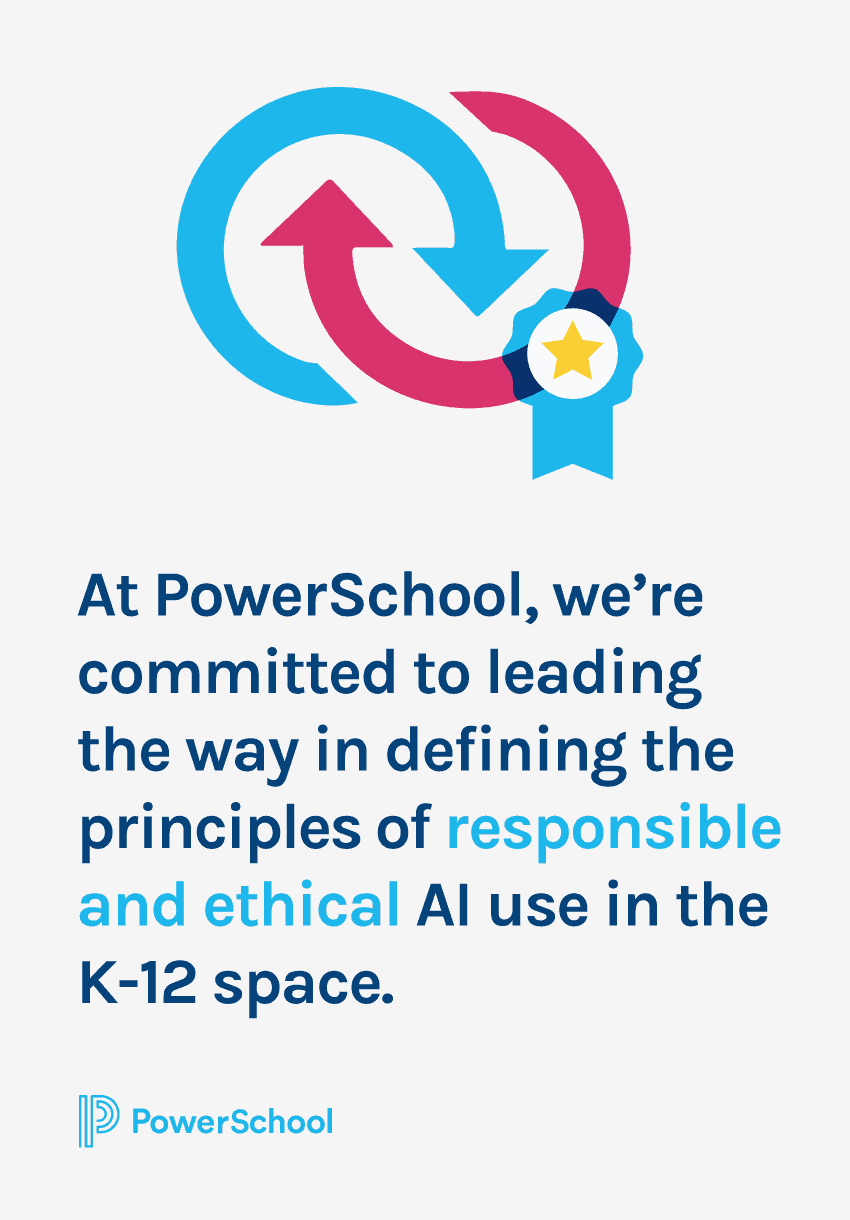Modern students need modern edtech tools. Learn why responsible AI design, development, and use are critical components of working toward improved student outcomes.
With the launch of ChatGPT, OpenAI’s chatbot designed to deliver articulate, human-sounding responses to user queries, artificial intelligence (AI)—and the ethical and practical questions associated with it—has reentered the public dialogue. At PowerSchool, we mindfully use the power of AI and Machine Learning (ML) to generate new insights about students and education systems. We believe AI-powered products further our mission to enrich the education ecosystem with connected technology that helps educators and students realize their full potential in their own way.
Like any technology, AI can only be as helpful as the way it is developed. At PowerSchool, we’re committed to leading the way in defining the principles of responsible and ethical AI use in the K-12 space. In this blog, we’ll address some of the challenges and concerns about using AI in education solutions and share PowerSchool’s principles regarding AI use.
How PowerSchool Envisions AI in the K-12 Space
PowerSchool’s vision for AI bolsters our mission to provide true personalized education to empower every student to achieve their maximum potential. Harnessing the power of AI, PowerSchool has embarked on a transformative journey to reshape education as we know it in both a responsible and ethical way.
By seamlessly and securely integrating intelligent algorithms and data-informed insights into our integrated suite of products, PowerSchool enables educators, students, administrators, and parents to experience truly personalized teaching and learning, and unparalleled efficiency, paving the way for a future where every learner can thrive for lifelong success.
In June, in front of educational technology leaders from across the country at ISTELive, PowerSchool announced our collaboration with Microsoft Azure OpenAI Service, which will enable us to provide personalized learning at scale in K-12 education. This collaboration integrates Microsoft Azure OpenAI Service to use its large language models within PowerSchool Performance Matters and PowerSchool LearningNav, part of the PowerSchool Personalized Learning Cloud.
The implementation of generative AI within these products will dramatically improve educators’ abilities to deliver personalized learning to students at scale by enabling the application of personalized assessments and learning pathways based on individual student needs and learning goals, all within a secure, safe environment.
What guides PowerSchool’s approach to AI use?
As we at PowerSchool continue to weigh potential applications and uses of AI and ML, we are committed to focusing on solutions that positively impact students. To maintain a mindful and responsible approach to AI, our use of AI is guided by the following principles:
- Human-centered. By its very nature, education will always have a significant human element. Technology augments what people do; it does not replace them. We will design AI-ML solutions accordingly to enhance and assist educational practices at every level.
- Built with Fairness & Bias Elimination. We will build observability to detect and identify bias in data and algorithms with the goal of reducing and eliminating bias from our applications. We will not reinforce unfair bias against users’ characteristics such as race, ethnicity, gender, nationality, income, sexual orientation, ability, and political or religious beliefs.
- Stringent Data Governance, Privacy, and Security. We will follow strict processes and controls including protecting student data privacy, security against adversarial attacks, and masking of Personally Identifiable Information (PII) data throughout model development and the deployment life cycle. We will use established, well-defined test plans, and strict quality assurance (QA) processes before releasing AI models to production.
- Transparency and User Control. Using application controls and permissions, we will allow each school system to decide who has access to which data and when users can use a particular AI-ML element. We will ensure algorithms, inputs, and output are transparent, fair, explainable, and interpretable.
- Digital Equity and Accessibility. We will ensure that our applications are designed and implemented in a manner that avoids discrimination, and promotes equal access and opportunities for all students, regardless of their background or characteristics.
- Ethical Use. We will ensure educational institutions can harness the potential of AI in an ethical and responsible manner, fostering a safe, inclusive, and effective learning environment for all students.
PowerSchool will not use AI that seeks to reinforce prejudices and biases seen in the education system, nor will it use AI that seeks to diminish the learning opportunities of students in a protected class.
 What are the challenges of using AI in education software?
What are the challenges of using AI in education software?
AI sits at the nexus of transformative innovation and immense power. Because of its potential, it’s generated much curiosity, as well as some wariness. This wariness stems from a variety of concerns.
- Perpetuation of bias. While AI is an incredibly powerful technology, AI systems can be only as objective as the data that is used to train the algorithms. Objectivity can also be compromised depending on how AI data results are applied.
- Lack of transparency. It can be difficult to understand how AI systems arrive at their decisions, causing distrust. In sensitive applications, such as criminal justice, healthcare, and education, this lack of transparency can be particularly problematic.
- Job displacement. As machines are increasingly capable of doing tasks people usually perform, there is a building suspicion that we are creating technology that might one day render human labor obsolete, with significant social and economic consequences.
- Privacy and security. AI systems often collect, process, and store large amounts of personal information which must be safeguarded from cybersecurity threats and attacks, while also respecting a data subject’s privacy rights for any personal data.
- Ethics. Some worry about surveillance, control, and surrendering human decision-making to machines.
Keeping a Human Touch in Digital Solutions
Before adopting any edtech solution, every educational community should ensure it thoroughly understands how the provider will use AI. Ultimately, responsible and ethical AI use can help all of us be more creative, empathic, and innovative.
PowerSchool Personalized Learning Cloud
Learn how PowerSchool’s Personalized Learning Cloud is the only solution to connect curriculum, instruction, and assessment to give teachers time back and elevate student outcomes.
Learn More
 What are the challenges of using AI in education software?
What are the challenges of using AI in education software?

